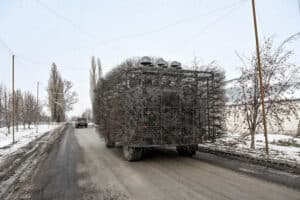The Russian-Ukrainian war has been blamed for increased food prices and high inflation.

With South Africans facing constant load shedding, job losses and high inflation, life is hard, but presidential spokesperson Vincent Magwenya says government is making headway towards ending the crisis.
Magwenya was responding to a question from The Citizen at the president’s public programme media briefing at the Union Buildings yesterday.
ALSO READ: Lower inflation welcome but not unexpected
“The government is seized with all these hardships and is seized on how we can alleviate this hardship, particularly for the most vulnerable citizens,” Magwenya said.
“Discussion is underway to look at the long-term nature of social support measures and instruments.”
Food prices and high inflation
Magwenya blamed the Russian-Ukrainian war for increased food prices and high inflation, stating it had caused difficulties for all African countries, not just South Africa.
“The conflict has a direct impact on … rising food prices as a result of the scarce availability of grain and fertilizer.
ALSO READ: Inflation at 13-month low in May
“We are dealing with an ever-emerging threat of food security on the continent. This has contributed to the hardships, including inflation. It is important to appreciate why this African peace mission is so important.”
On Eskom, Magwenya said the government remained on course to ensure energy supply to the country.
“It may feel that we are moving at a snail’s pace but we are seeing very encouraging signs ofprogress which must be acknowledged,” he said.
“The minister of electricity [Kgosientsho Ramokgopa] has made some significant headway in this regard through his various engagements. He has recently travelled in Asia where he brought back a lot of case studies, as well as the potential partnership that we can pull in the execution of the energy action plan.”
ALSO READ: Inflation: Milk, eggs and cheese prices sky rocket to its highest in 14 years
Magwenya said the government acknowledged some of the units at power stations were behind the unplanned electricity outages. However, through the national energy crisis committee and in the execution of the energy action plan, there had been an improvement in maintenance and the energy availability factor was now more than 60%.
‘Not just a South African issue’
Independent economist Professor Bonke Dumisa said he was encouraged and comfortable government was trying its best within reason to deal with the challenges faced by the country.
“The president and the other African heads of state’s visit to Russia and Ukraine, many people thought was just a PR exercise but it proved to be very useful in that it exposed misleading representation from both countries.”
ALSO READ: Night-time shopping booms as Zimbabwe inflation soars
Dumisa said inflation was not only a South African issue.
“As we are complaining about the inflation, which improves to 6.3% for May, the European Union is battling with inflation at over 8%; the UK is still battling with inflation at over 10% and they are all struggling with how to balance the interest rate hike as a blunt instrument,” Dumisa said.
Support Local Journalism
Add The Citizen as a Preferred Source on Google and follow us on Google News to see more of our trusted reporting in Google News and Top Stories.






